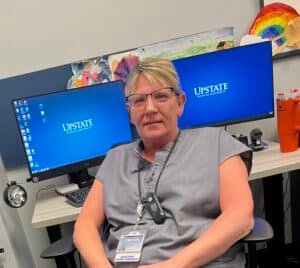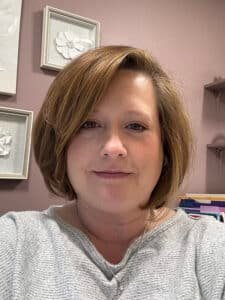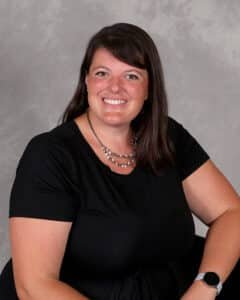Shifting from a different career to nursing is easier than ever
By Deborah Jeanne Sergeant

Tammy White had operated a hair salon making a good income to support herself and her children as a single mom with no other means of income.
But by her late 20s, she knew she wanted to become a nurse.
Once her sons were teens and less dependent on her help, she realized it was time to pursue her dream of nursing. Academically, the shift from salon owner to student was tough.
“Given it had been 19 years since I graduated high school, I had to start all over with the basics of English, math and sciences that were required prior to enrollment in a nursing program,” White said.
For White, taking part-time classes — just two per semester — helped her ease into the academic world again. She attended one class in-person and one online. After a couple of years of tackling the prerequisites, she applied to nursing school at Onondaga Community College.
“It was my choice because of the flexibility,” White said. “While it is a self-taught program for the most part, there are plenty of resources and educators available.”
Some hands-on classes required in-person attendance, but much of the theory classes were remote. This factor helped her balance working full time while obtaining her associate degree in nursing while in her 40s.
Six months after taking the NCLEX nursing exam and beginning her new role as a med-surg registered nurse, she enrolled in an online RN-to-BSN program through Utica College.
“Seven years later in my 50s, I am an assistant nurse manager with a bachelor’s degree in nursing,” White said. “It is never too late to pursue a new career if it is something you really want. It was not easy, but it is possible with the flexibility of hybrid courses.”
White works in physical medicine and rehabilitation at Upstate University Hospital.

For Kim Testa, who earned a Master of Science degree in nursing, registered nurse and critical care registered nurse certification, “Becoming an RN mid-career was challenging, but the best challenge I had ever set out for myself,” Testa said. She works as a nurse manager and nursing support services float and support pool at Upstate Community Hospital.
She already filled the roles of wife and mother of two girls and worked 30 hours a week as a new-to-practice licensed practical nurse. It was tough to earn the additional credits to become a registered nurse, but having a determined mindset helped Testa, along with “being very structured and strategic with planning,” she said.
The support of the workplace makes a difference, especially for the LPN to RN path and for those studying nursing mid-career.
“We have a very strong educational foundation and we will support people throughout the health system if they decide they want to pursue a nursing degree,” said Katie Pagliaroli, registered nurse and chief nursing officer and senior vice president for clinical operations at Oswego Health.
It could include people beginning their nursing education part-time or taking classes at nights, on weekends or through hybrid arrangements. Pagliaroli said that many students begin with an associate degree earned through a combination of in-person clinical classes and remote classes. Within 10 years, they’re required to complete a bachelor’s degree and many of those classes may be completed online — perfect for working professionals.
“Nursing is a career that’s a calling and people don’t always know when they exit high school that it’s a pathway they want to go down,” Pagliaroli said. “That’s one reason it’s important to offer these opportunities.”

Some people enter the healthcare field at an entry-level role and realize that’s what they want to do eventually. Because of the high demand for nurses, Pagliaroli said it’s vital to offer many pathways to nursing.
“We have a process where we will pay for their nursing education as they go through it and we ask for them to work for us for about two years after they’re done,” she said. “When they’re graduate nurses, we offer a great registered nurse residency program where people can get into a specialty program right after school. They’ll be a nurse for about a year in different areas before they transfer to a specific area.”
Pagliaroli encourages anyone interested in nursing to talk with a nurse and ask about their experience. It’s also helpful to talk with nursing schools and ask about how their program’s flexibility would mesh with family and employment commitments.
“If they had chemistry and algebra in high school no matter how long ago and meet the B average, they can apply to whichever partner program they’re interested in,” said Cathy Brownell, nursing department chairwoman at Le Moyne. “We look at it and the partners’ school looks at it and makes an enrollment decision. We start with general core courses focusing on anatomy, psychology, physiology, that are foundational to the clinical courses they’ll take with the partner school.”
After two semesters at Le Moyne, students can take classes through the partner school while still at Le Moyne for four more semesters to graduate with an associate degree.
“We are putting more and more of our nursing courses online and they’re all online if between the regular sessions,” Brownell said. “We’re putting some online even during the regular semesters. A lot of the core courses are also online. We have a lot of evening courses.”
The summer accelerated program offers three-credit classes that run five weeks.
“We are desperate for a well-educated nursing workforce,” Brownell said. “We need to meet students where they are.”
Where to Go to Become a Nurse
Looking for a nursing school? You have plenty of options in the region.
• LeMoyne College
• Bryant & Stratton
• Bill and Sandra Pomeroy College of Nursing at Crouse Hospital
• Cayuga Community College
• Morrisville State College
• Onondaga Community College
• CiTi BOCES
• College of Nursing SUNY Upstate
• St. Joseph’s Health College of Nursing

